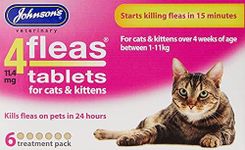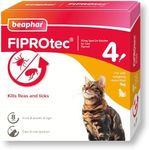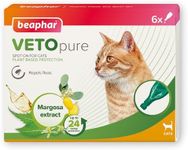Buying Guide for the Best Flea Treatments For Cats
Choosing the right flea treatment for your cat is crucial for their health and comfort. Fleas can cause a range of issues from mild irritation to severe allergic reactions and even anemia in severe infestations. When selecting a flea treatment, consider your cat's lifestyle, health status, and any specific needs they may have. It's also important to understand the different types of flea treatments available and how they work, so you can make an informed decision that best suits your cat's needs.Type of TreatmentFlea treatments come in various forms, including topical treatments, oral medications, collars, and sprays. Topical treatments are applied directly to the skin and are effective for cats that are comfortable with handling. Oral medications are ingested and can be a good option for cats that are difficult to handle. Flea collars provide long-term protection and are suitable for cats that spend a lot of time outdoors. Sprays can be used for immediate relief but may require frequent application. Consider your cat's temperament and lifestyle when choosing the type of treatment.
Active IngredientsThe active ingredients in flea treatments are what kill or repel fleas. Common ingredients include fipronil, imidacloprid, and selamectin. Each works differently, with some killing adult fleas and others targeting eggs and larvae. It's important to choose a treatment with an active ingredient that addresses the specific stage of the flea life cycle you are dealing with. If your cat has had reactions to certain ingredients in the past, consult with a veterinarian to find a safe option.
Duration of EffectivenessThe duration of effectiveness refers to how long the treatment will protect your cat from fleas. Some treatments offer protection for a month, while others can last up to eight months. If your cat is frequently exposed to fleas, a longer-lasting treatment might be more convenient. However, if you prefer to monitor and adjust treatments more frequently, a monthly option could be suitable. Consider your ability to regularly administer treatments and your cat's exposure risk when deciding on duration.
Age and Weight RestrictionsFlea treatments often have specific age and weight restrictions to ensure safety and effectiveness. Kittens and smaller cats may require different dosages or formulations than adult or larger cats. Always check the product label to ensure it is appropriate for your cat's age and weight. If you have a kitten or a cat with health issues, consult with a veterinarian to find a treatment that is both safe and effective for their specific needs.
Water ResistanceWater resistance is an important factor if your cat is frequently bathed or exposed to water. Some flea treatments maintain their effectiveness even after exposure to water, while others may require reapplication. If your cat enjoys water or you live in a rainy area, consider a water-resistant option to ensure continuous protection. Evaluate your cat's lifestyle and environment to determine if water resistance is a necessary feature for their flea treatment.



















